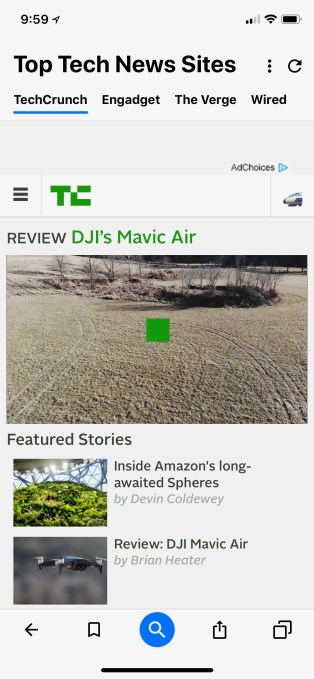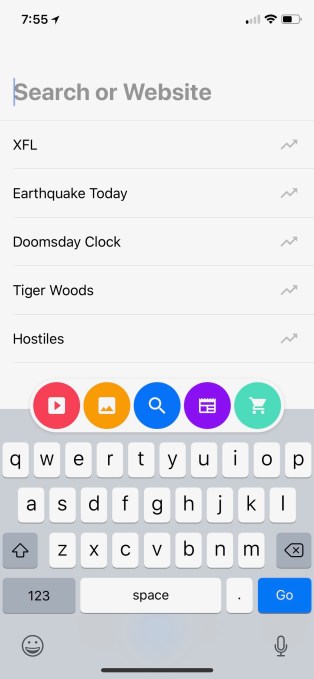A startup called Cake has an ambitious plan to take on incumbents like Chrome and Safari to build a better browser for mobile devices. The company announced this morning it has raised $5 million for those efforts from Peak Ventures, Pelion Ventures and Kickstart Seed Fund.
Cake was founded in late 2016 in Provo, Utah by Jase Bosarge, who had originally developed technologies and a resulting patent portfolio that was later licensed to Google for Gmail. Last July, the company brought on 14-year head of product from Ancestry.com, Kendall Hulet, to serve as CEO.
The idea behind the browser is to rethink how consumers want to search the web from mobile devices – that serving up a standard set of links to click is something that no longer makes sense, that is.
“Browsers today are still very similar today to what they were 15 years ago,” explains Hulet. “They weren’t reimagined for mobile – they’re basically desktop experiences crammed onto a mobile phone,” he says.
In addition, the company claims that returning a list of links it takes 87 percent longer to get to the first organic listing on their phone than on their desktop.
In Cake, the idea is to largely eliminate the index page in favor of a swipeable set of search results in various verticals, like web search, image search, video, news, and shopping. Pages are pre-loaded for faster results, but Cake tells us it’s not serving Google AMP-based pages (Google’s accelerated mobile pages).
Instead of returning a link list, the browser just loads the best result, and then allows you to swipe horizontally through other related pages. This makes moving through search results quicker, and can even help expose you to results you may not have otherwise clicked.
[gallery ids="1592388,1592389,1592390,1592391,1592392,1592393,1592395,1592396,1592426"]
Above: Cake browser and setup screens. Cake lets you pick your search engine thanks to relationships with various search partners. (Disclosure: Yahoo Search is operated by Oath, TechCrunch’s parent company.)
In the case of searching for a particular news item, that may mean you’ll find yourself swiping through stories from news sources you otherwise may have skipped – like CNN or Fox News, depending on how you lean.
You can choose which search engine serves you the news – Google, Yahoo, or Bing – but you can’t customize the sources in order to build yourself a news bubble where you’re only exposed to those sites whose content matches your belief system.
Cake can also serve up groupings around news – like “Top Tech News” – which can serve as an easy way to just catch up on whatever is happening, without the need for a specific query.

In other verticals, the customization options differ.
For example, in image search, you can toggle on or off sources like Imgur, Flickr, Picsearch, and others, in addition to the search engines. In video, you could turn on or off YouTube or Vimeo, or Google, Bing, Yahoo, or Yandex results.

Cake shows search trends
The browser doesn’t yet generate revenue, but the company has ideas about how it could insert a search result that’s really an ad in the middle of its returned pages to swipe through. For instance, if you were shopping for a particular item – like a black cocktail dress – a retailer could advertise their product’s landing page in your shopping search results alongside the organic results.
“We have an opportunity to really reimagine the way advertising works on mobile search,” says Hulet. “We’re focused on making the best experience for a mobile browser, inclusive of advertising.”
Ads are not yet live in Cake, however.
We had a chance to test out Cake’s browser, in beta, ahead of today’s public launch.
While it’s definitely a different sort of experience – more like consumer social app with its youthful, brightly colored, card-style design – it didn’t always work exactly as advertised. (This could be the result of some A/B testing, we were told.)
For instance, a search for “Elton John tour dates” – the news du jour on one day we were testing – oddly returned Google’s own search results first. You could then swipe over to other news sites and Elton John’s homepage for more information. (The homepage had more details, while Google search results weren’t as useful with their big Knowledge Graph-powered card about the singer, lists of songs, links to Wikipedia and more).
Little things are also more cumbersome than they should be, like starting a new search.

A search for “trump” takes you through the day’s news
When you tap on any of the rounded search vertical icons at the bottom of the screen after having performed one search query, the app assumes you want to now search in that new vertical for your original search term, instead of letting you enter a new query. You have to reposition your cursor with a tap, then delete the existing text and type in your new query. (Or launch a new tab entirely.)
Also, after doing so (before you type in your query), if you realize you meant to be in the image vertical and not the web search vertical, tapping the buttons at the bottom to switch between them doesn’t work. That is, you have to enter in your keywords first before you can pick the button for the search vertical you want. This isn’t that big of a problem, but it feels weird to have buttons that suddenly don’t do anything.
Notably, the browser lacks a voice search button, which is where mobile search and assistance is headed.
Many of these are minor quibbles with a beta release that could be improved in time, but they disrupt the overall experience.
That being said, it’s unusual to see anyone trying to innovate in mobile browsers today, so it’s worth tracking Cake’s efforts to see if it can make further improvements.
If web search doesn’t work out, however, the company says it’s open to licensing its technology to other applications.
“We believe the technology we’re in the process of patenting could have multiple applications. We believe a web browser’s a great application,” says Hulet. “We’d love to explore any conversation,” he added, when asked how he would handle a question around licensing.
This may make more sense for Cake’s IP than trying to reinvent mobile search with a new browser – there are plenty of other applications where search is antiquated, or could use a bit of innovative polish.
